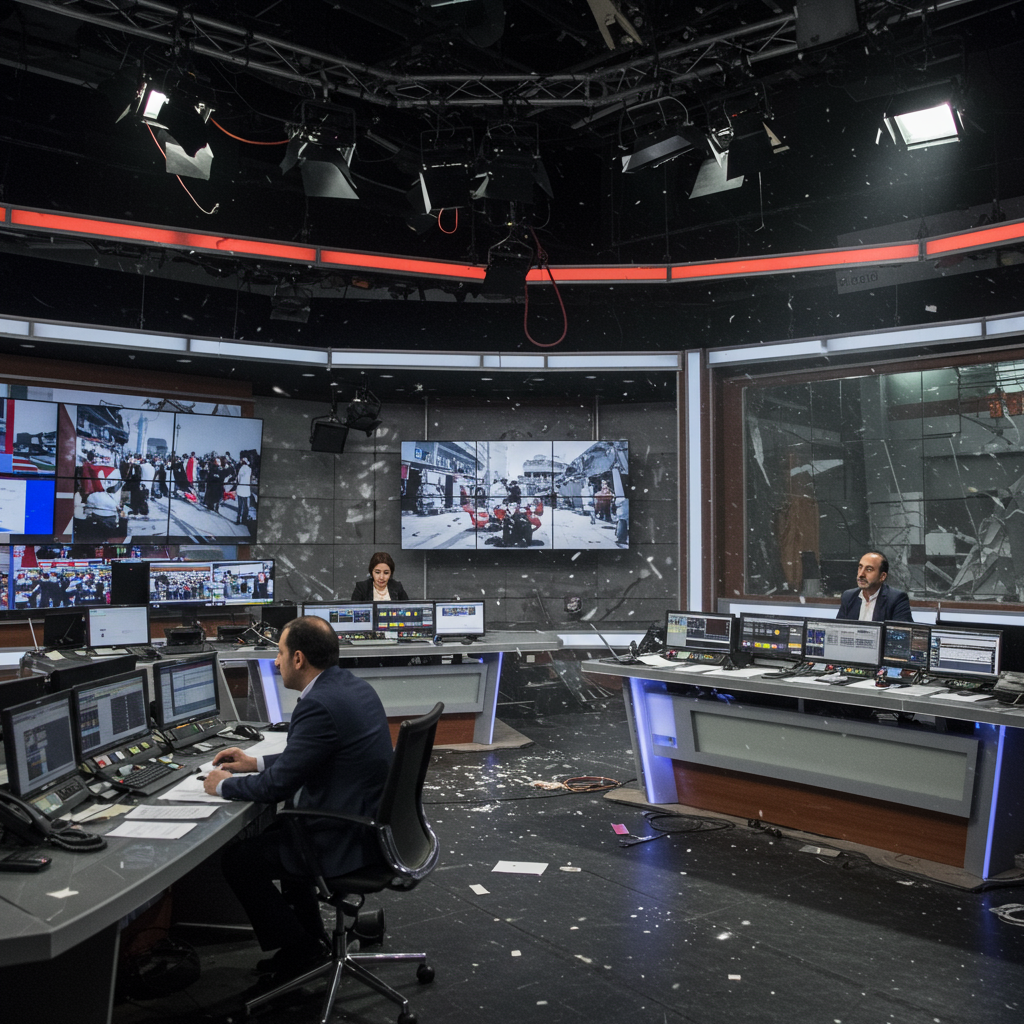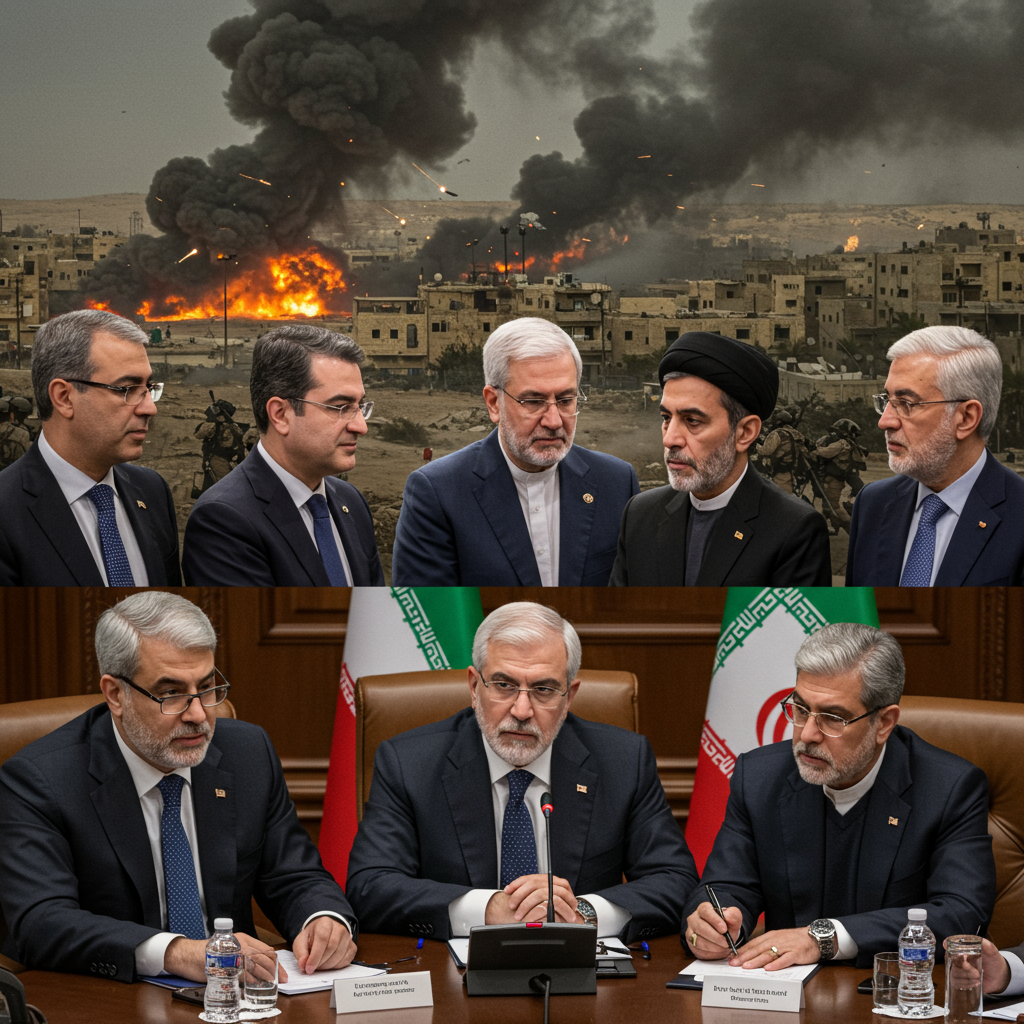Dramatic Attack on Iran’s State Broadcaster
An Israeli air strike directly targeted the headquarters of Iran’s state television in Tehran on Monday, dramatically interrupting a live news broadcast and escalating the ongoing conflict between the two nations. The attack occurred after the Israeli military issued evacuation warnings to residents in the area.
Viewers watching the Islamic Republic of Iran Broadcasting (IRIB) channel IRINN witnessed the moment the strike hit. On-air, blasts could be heard as anchor Sahar Emami reacted to the sounds. Studio lights went out, and debris filled the air, forcing the anchor off-camera. Reports from inside the studio described hearing exclamations of “Allahu akbar” as chaos erupted before the screen cut to pre-recorded programming. The broadcast later resumed from a different location, with subsequent reports and images showing smoke and flames rising from the building, known as “the glass building,” which was reportedly struck by multiple bombs.
Casualties and Damage Reported
The attack resulted in casualties within the state broadcaster’s facility. Iran’s semi-official Fars news agency reported that Masoumeh Azimi, an employee of the IRIB Secretariat, was killed. Other reports indicated several staff members were injured. Peyman Jebelli, the head of IRIB, appeared on television after the strike displaying blood-stained paper and declaring that the channel and its employees would continue their work “until the end,” portraying Iranian media as a target in a “hybrid war.”
Israel Justifies Strike on ‘Propaganda Authority’
Israel’s Defence Minister Israel Katz quickly claimed responsibility for the strike, explicitly calling IRIB the “propaganda and incitement broadcasting authority of the Iranian regime.” The Israeli military stated it targeted a “communications centre of the Iranian regime,” alleging it was used by military forces to conduct operations “under the cover of civilian assets and infrastructure.” They emphasized the strike followed prior evacuation warnings to civilians in the vicinity.
Iran Condemns Attack as ‘War Crime’
Iranian officials vehemently condemned the attack. The foreign ministry spokesman called it a “wicked act” and a “war crime.” Iran’s Ambassador to the UN labeled the strike a “direct assault on press freedom” and accused Israel of being the primary “killer of journalists and media people,” drawing comparisons to the high number of journalists killed in Gaza. The Committee to Protect Journalists (CPJ) also voiced alarm, stating it was “appalled” by the bombing of a live broadcast and suggesting the perceived impunity for targeting media in Gaza may embolden attacks elsewhere. Iran’s foreign ministry also called for the UN Security Council to act.
Context of Escalating Conflict
The strike on IRIB unfolded on the fourth day of severely intensified hostilities between Israel and Iran. The confrontation significantly escalated following Israeli operations that began Friday, targeting Iran’s nuclear program and ballistic missile infrastructure. The Israeli military claimed “full air superiority” over Tehran, asserting its capacity to strike within the capital.
In retaliation, Iran has launched waves of missile and drone attacks targeting areas in northern and central Israel. These attacks have resulted in casualties, including four deaths in a residential building in Petah Tikvah and damage to the US consulate in Tel Aviv. Casualty figures for the overall conflict are sharply disputed: Iran reports over 220 killed in Iran from Israeli strikes since Friday, while Israel states Iranian attacks have killed at least 24 people in Israel over the same period.
Other specific incidents reported during the escalation include an Israeli strike hitting an ambulance belonging to the Iranian Red Crescent, killing three first responders, which the Red Crescent called a crime against international humanitarian law. Iran also alleged a hospital in Kermanshah was damaged by Israeli projectiles, though a human rights group suggested nearby IRGC military storage might have been the actual target, accusing the force of using civilians as “human shields.” Reports also emerged of an Israeli strike targeting a Quds Force command center, reportedly killing four officials, including a head of IRGC intelligence.
Tehran Under Threat: Evacuation and Panic
Prior to the strike on IRIB, the Israeli military issued a widespread evacuation order affecting western Tehran’s District 3. This area, estimated to house up to 330,000 people, contains major facilities including the state TV building, police headquarters, and three large hospitals. Residents were warned to evacuate immediately due to planned strikes on military infrastructure in the vicinity, mirroring warnings Israel has issued in Gaza and Lebanon.
The escalating violence has instilled a mood of “panic and fear” among Tehran residents. Many were described as fleeing the city, causing significant traffic congestion. Residents reported hearing “constant” explosions from both incoming Israeli strikes and outgoing Iranian air defenses. Accounts also detailed panic buying at bakeries and closed shops, illustrating the widespread disruption and fear, although some residents expressed a determination to stay.
Leadership Perspectives and Warnings
Leaders on both sides weighed in on the strategic implications. Israeli Prime Minister Benjamin Netanyahu stated that controlling the skies over Tehran was a game-changer, key to achieving Israel’s goals of eliminating Iran’s nuclear and missile threats, contrasting Israeli actions (warning civilians) with Iranian actions (targeting them). Former US President Trump commented that Iran was “not winning this war” and should negotiate. Iran’s Foreign Minister suggested Netanyahu’s actions were aimed at disrupting potential US-Iran talks and warned that Iran’s responses would continue if Israeli aggression did not cease.
Adding another layer to the media targeting, following the strike on IRIB, Iranian state TV issued its own evacuation warnings for specific Israeli news channels (N12 and N14), framing it as a direct response. The attack on IRIB also drew attention to Israel’s history of targeting media organizations in conflicts in Lebanon, Gaza, and the occupied West Bank.




